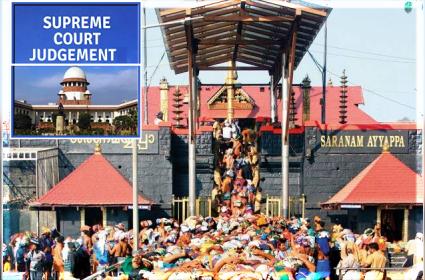SC ON SABARIMALA: Refers All The Petitions To Larger Bench

NEW DELHI: The Supreme Court on Thursday referred all the petitions against its order allowing women of all ages to enter Sabarimala temple to a 7-judge bench.
Chief Justice of India Ranjan Gogoi said the question of whether women of all ages should be allowed into Sabarimala was part of a larger debate that also includes issues like allowing Muslim and Parsi women to enter religious practice. The pending issue was now sent to larger bench in 3:2 verdictas Justices Nariman and Chandrachud expressed dissent.
A five-judge Constitution bench, headed by outgoing Chief Justice of India Ranjan Gogoi, was considering 65 review petitions (including review pleas and writs), against its 2018 verdict, which granted entry to women in the menstruating age group to Sabarimala. The review petitions have been kept aside and the SC has decided that a larger bench will now re-hear the entire case once again.
Reading out the judgment, the bench said petitions had “sought to revive the debate about what's the religion and essential religious practices”. “Individual right to pray at the temple cannot be superior to what is considered as religious by another sect is what petitions have argued,” the court said.
The bench comprised of CJI Ranjan Gogoi, Justices Rohinton Nariman, AM Khanwilkar, DY Chandrachud and Indu Malhotra. While Chief Justice of India Ranjan Gogoi and Justices Khanwilkar, Indu Malhotra ruled in favour of sending the plea to a larger bench, Justices Nariman and DY Chandrachud dissented.
"Endeavour of the petitioner is to revive the debate on what is an integral part of the religion. Both sections of the same religious group have the right to propagate practices of them. Faith perceived by one group is not the same as another," the CJI said. "Fresh opportunities to be given to all parties," the Chief Justice added.
It has to be recalled that on September 8, 2008, the Sabarimala Temple in Kerala dedicated to Lord Ayyappa was opened to the women in the age group of 10-50, saying it was violative of their fundamental rights and constitutional guarantees. A Constitution bench, headed by the then CJI Dipak Misra, gave a 4:1 verdict claiming the ban led to gender discrimination. The pathbreaking judgment has left the temple tantris (priests) and those associated with it by tradition disappointed. Many leaders and religious leaders expressed disagreement with the court's observation and opined that it may bring an adverse impact on society. It also has led to massive protests in Kerala, which resulted in a political slugfest between then ruling CPI-M and the BJP.
On October 8, multiple petitions were filed in the Supreme Court to seek review of its verdict to lift a ban on the entry of women in the 10-50 age groups into the temple, contending that religious practices cannot be "tested on the basis of rationality". As many as 64 petitions, which include review pleas and transfer pleas, have been filed in the apex court challenging its decision on the entry of women into the Sabarimala temple. On the last day of the hearing, in what appeared to unprecedented, Travancore Devaswom Board (TDB), which handles management of Sabarimala temple in Kerala, reversed its stand in the top court by expressing its support to the 2018 court verdict, which had allowed women of all age groups to enter the shrine.
























